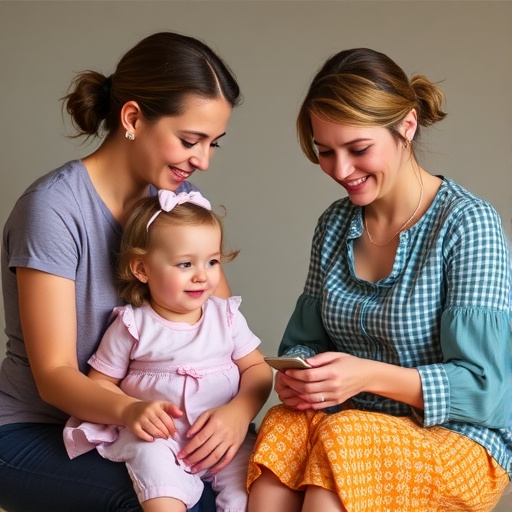In recent years, the conversation surrounding reproductive decision-making among adult women has gained momentum, signifying a shift in societal norms and expectations. A thought-provoking study, conducted by researchers Mehta, Davis, and Smith, delves into the layers of complexity surrounding women’s choices on whether to have children. This study is particularly crucial as it addresses established adult women, who often face social and biological pressures while navigating their reproductive options.
The question posed in the study title, “Shouldn’t I Know If I Want to Have Kids or Not?” captures the duality of confusion and expectation that many women experience when contemplating motherhood. Societal narratives frequently dictate that parental instincts should be innate, yet many women report feeling uncertain. This disconnect can lead to feelings of guilt, inadequacy, or societal pressure, inevitably impacting their overall mental health.
Researchers focused on specific factors that influence reproductive decision-making, including personal aspirations, relationship dynamics, and external societal pressures. The authors emphasize the growing trend of delaying motherhood due to factors such as career aspirations, financial stability, and the pursuit of personal goals. A substantial number of women resonate with the idea of motherhood but are often confronted with the realities of timing and societal expectations.
The study employs qualitative methods, gathering insights from various participants on their reproductive experiences. Through in-depth interviews and personal narratives, the researchers compiled a myriad of emotions, concerns, and aspirations that women face. Central to their discoveries is the revelation that women possess a diverse range of desires toward motherhood, often fluctuating with their circumstances and life stages. This complexity underscores the urgency of addressing reproductive planning in a nuanced manner.
Moreover, the findings highlight the emotional turmoil that can accompany the decision-making process. Women expressed feelings of anxiety regarding their reproductive choices, particularly when facing questions about their motivations and desire for children. Some participants shared experiences where societal expectations created confusion, leading to self-doubt and frustration. The narrative suggests that it is imperative to normalize these discussions, allowing women to voice their uncertainties without fear of judgment or stigma.
As women navigate their reproductive decisions, the study found that support systems, including friends, family, and partners, play a pivotal role in shaping perceptions. Those who felt understood by their networks were more likely to explore their feelings about motherhood openly. Conversely, women without robust support systems often felt isolated, amplifying their stress and leading to indecisiveness. This dynamic reinforces the importance of fostering open dialogues around reproductive choices in both social and familial contexts.
Another significant aspect examined in the study is the impact of cultural narratives on women’s reproductive decisions. Many participants highlighted how their backgrounds influenced their views on motherhood, with varying expectations attached to different cultural norms. This emphasis on ethnicity and cultural context emphasizes that there is no one-size-fits-all approach to reproductive decision-making. The differences illustrate the importance of culturally sensitive education and discussion platforms that resonate with diverse audiences.
Interestingly, the discourse is also reflective of the broader conversations about women’s autonomy and rights. In light of ongoing debates around reproductive health policies, the research underscores the essentiality of placing women’s choices at the forefront of family planning discussions. Advocating for access to education about reproductive health, contraception, and family planning resources proves vital for empowering women in their decisions.
The accessibility of information and healthcare services significantly influences women’s reproductive choices. Many respondents cited a lack of easily accessible reproductive health services, which often hindered their ability to make informed decisions. There’s a pressing need for improved healthcare policies that cater to women’s unique needs, offering comprehensive resources that bridge the gap between desire and access.
The study’s conclusions pave the way for future research to further dissect the complexities of reproductive decision-making. As societal expectations evolve, understanding the nuances of women’s choices will be critical in the quest for equitable reproductive rights and healthcare access. Future studies could expand on generational change effects, examining the perspectives of younger women in comparison to established adults.
In synthesizing these crucial findings, the research by Mehta, Davis, and Smith serves as a profound call to action for society to rethink its approach to women’s reproductive autonomy. Promoting awareness, facilitating informed discussions, and providing necessary resources can empower women to make confident choices about their reproductive futures.
Ultimately, the dialogue surrounding women’s reproductive decision-making continues to be a vital subject, reflecting broader societal values and changes. As the study reveals, understanding and supporting each woman’s unique journey towards reproductive choices not only enriches individual narratives but also fosters a more inclusive society.
As the study looks ahead to the future of reproductive decision-making, it highlights the importance of ongoing conversations that help remove the stigma and confusion surrounding motherhood. Embracing diverse perspectives ensures a well-rounded understanding of what it means to be a woman in today’s world, ultimately enriching the societal fabric in which these discussions occur.
Subject of Research: Women’s reproductive decision-making
Article Title: “Shouldn’t I Know If I Want to Have Kids or Not?”: Established Adult Women’s Reproductive Decision Making
Article References:
Mehta, C.M., Davis, G.E. & Smith, K. “Shouldn’t I Know If I Want to Have Kids or Not?”: Established Adult Women’s Reproductive Decision Making.
J Adult Dev (2025). https://doi.org/10.1007/s10804-025-09530-0
Image Credits: AI Generated
DOI: 10.1007/s10804-025-09530-0
Keywords: reproductive decision-making, women’s autonomy, motherhood, societal expectations, qualitative research.




